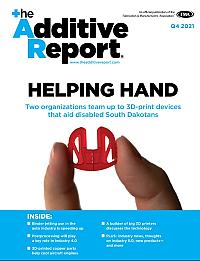- FMA
- The Fabricator
- FABTECH
- Canadian Metalworking
Our Publications
Categories
- Additive Manufacturing
- Aluminum Welding
- Arc Welding
- Assembly and Joining
- Automation and Robotics
- Bending and Forming
- Consumables
- Cutting and Weld Prep
- Electric Vehicles
- En Español
- Finishing
- Hydroforming
- Laser Cutting
- Laser Welding
- Machining
- Manufacturing Software
- Materials Handling
- Metals/Materials
- Oxyfuel Cutting
- Plasma Cutting
- Power Tools
- Punching and Other Holemaking
- Roll Forming
- Safety
- Sawing
- Shearing
- Shop Management
- Testing and Measuring
- Tube and Pipe Fabrication
- Tube and Pipe Production
- Waterjet Cutting
Industry Directory
Webcasts
Podcasts
FAB 40
Advertise
Subscribe
Account Login
Search
Mixed feelings about additive manufacturing business acquisitions
There are positives and negatives to larger 3D-printing companies buying smaller competitors
- By Kip Hanson
- December 20, 2020

While there are some positives, The Additive Report writer Kip Hanson contends that business acquisitions within the additive manufacturing industry can mostly stifle 3D printing innovation. Getty Images
3D Systems buys Z Corp. Stratasys buys MakerBot. General Electric buys Arcam and Concept Laser. These are just a few of the many headlines in recent years about one 3D printer manufacturer eating up a smaller manufacturer, usually one with a competing—often patented—technology.
Nothing against these companies, but I’m no fan of acquisitions. To me, it seems like a shortcut—a shortcut to innovation, a shortcut to market share. And I’m especially leery of big investment firms that have no skin in the manufacturing game and are only looking to make a quick buck. It’s opportunistic.
One might argue this is jealousy talking, knowing that no one will ever acquire my little one-man writing operation and turn me and my family into instant gazillionaires. (Sorry, Honey.) When I die, the words die with me. Nothing worthy of investment here.
In fact, that’s exactly what I told one such individual on LinkedIn recently, an investor looking for “strategic partnerships as well as acquisition opportunities.”
Sorry, buddy. It’s just words.
Consider this: Where would the automotive world be had Henry Ford sold his fledgling company to General Motors, an event that history indicates nearly occurred? Imagine, no Model A, or for that matter, no F-150. And neither the Mercury nor the Edsel would have existed.
Call me naïve, but it would have been a loss if GM had bought Ford.
Now consider if Charles Hull had sold out to Stratasys, or vice-versa? Or if GE’s bid to acquire SLM Solutions rather than Concept laser had been successful? The list of what-ifs is a long one.
I know this is the way business works. It’s a dog-eat-dog world, after all, and I’m sure that I would take similar advantage or avail myself of such market-driven and technical opportunities were the shoe on the other foot.
And there is some good that comes from acquisitions. The acquired companies—assuming they are not dissolved—have more working capital with which to expand operations and improve their technology. And from the customer side, working with a large company generally means better support and additional product options.
Some might argue that acquisitions lead to increased competitiveness, that working capital is the true mother of invention. I guess we’ll never know.
In the meantime, anyone looking to acquire a writing business?
About the Author

Kip Hanson
About the Publication
- Podcasting
- Podcast:
- The Fabricator Podcast
- Published:
- 04/16/2024
- Running Time:
- 63:29
In this episode of The Fabricator Podcast, Caleb Chamberlain, co-founder and CEO of OSH Cut, discusses his company’s...
- Trending Articles
- Industry Events
16th Annual Safety Conference
- April 30 - May 1, 2024
- Elgin,
Pipe and Tube Conference
- May 21 - 22, 2024
- Omaha, NE
World-Class Roll Forming Workshop
- June 5 - 6, 2024
- Louisville, KY
Advanced Laser Application Workshop
- June 25 - 27, 2024
- Novi, MI


























